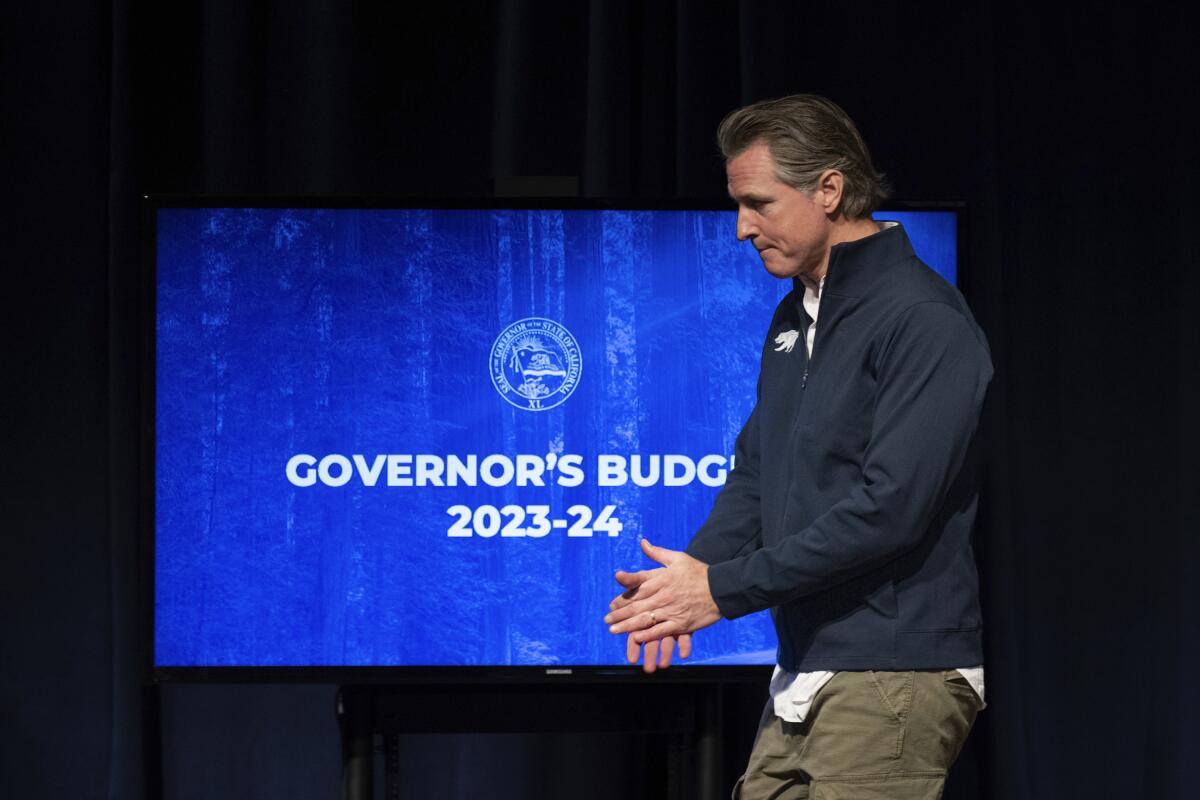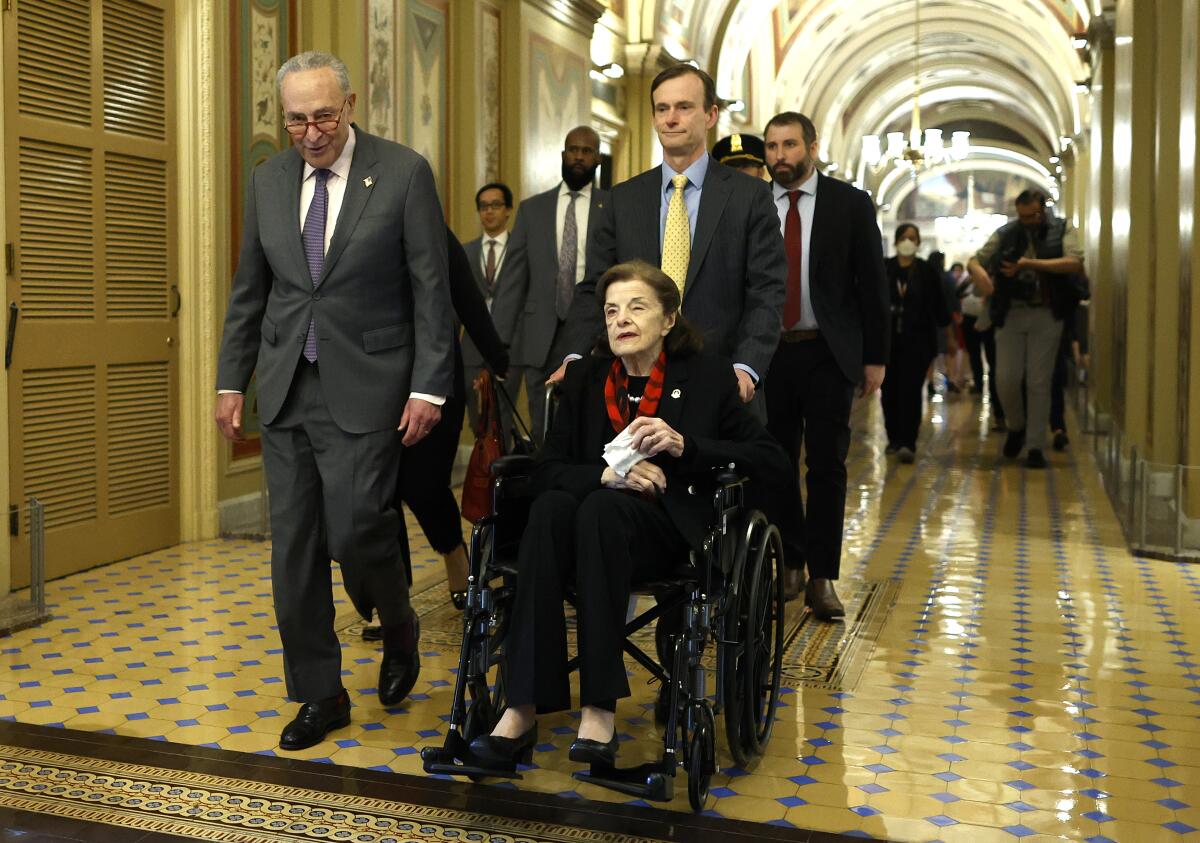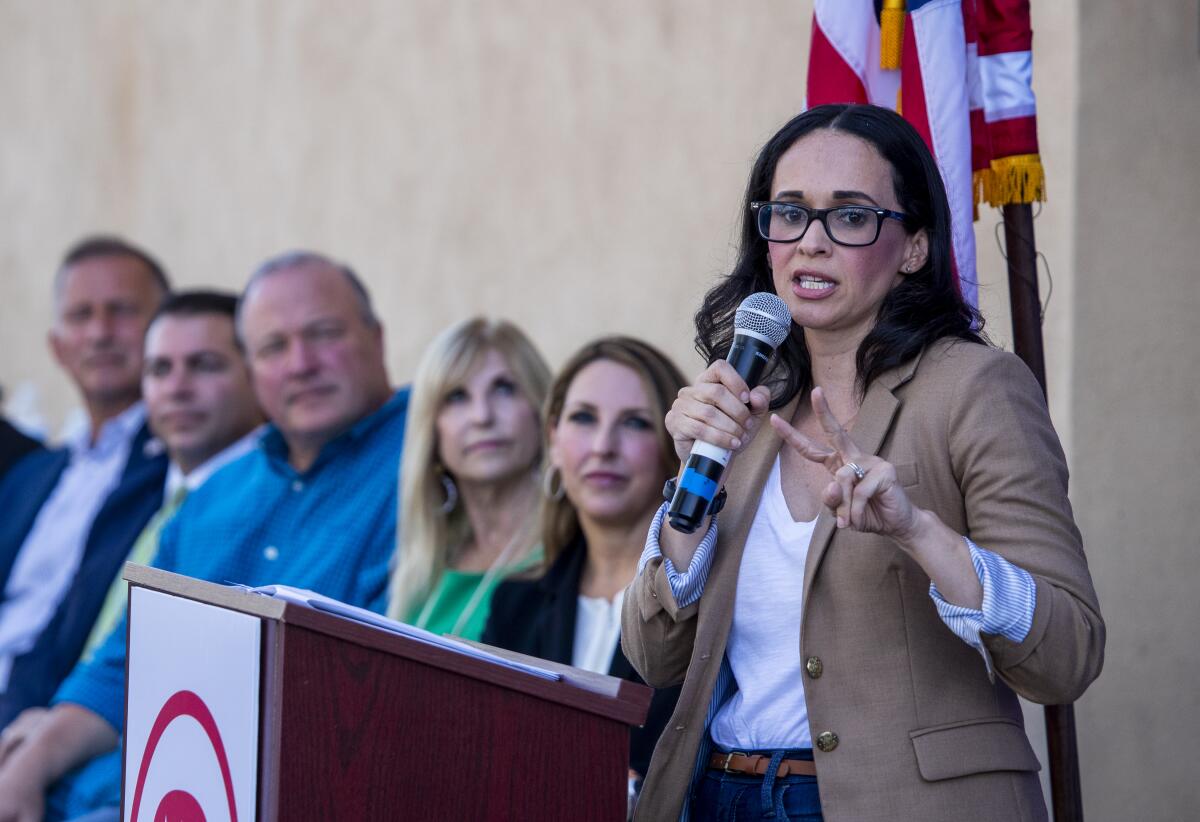California Politics: Newsom’s vision meets budget reality

SACRAMENTO — With a flush budget during his first term, Gov. Gavin Newsom signed into law an ambitious vision for California — as a state that will provide preschool to all 4-year-olds, healthcare to all low-income residents, and, possibly, reparations for people harmed by the nation’s legacy of slavery.
But it’s in his second term that Newsom will determine, through funding decisions and implementation plans, if his vision will become a reality. And with the state’s finances now running into the red, the obvious question is whether the governor will scale back or delay the rollout of his progressive agenda.
We’ll get a better picture of that Friday when Newsom unveils his updated state budget proposal for 2023-24. In January, he projected a $22.5-billion deficit, and he proposed cuts and funding delays to climate programs, public transportation, child care and support for foster youth. The deficit figure he’ll announce tomorrow is likely to be even bigger and may include deeper cuts that the governor will have to negotiate with legislative leaders over the coming month as lawmakers prepare to pass a budget by June 15.
Even if Newsom maintains funding commitments to expand preschool and Medi-Cal healthcare, as he did in January, those marquee initiatives that he signed into law in his first term are already showing some trouble signs:
- A year into California’s $2.7-billion expansion of preschool — intended to make a new public-school grade for every 4-year-old by 2025 – family interest in the program has been surprisingly lackluster and many school districts are still focused on meeting the most basic requirements, writes Jenny Gold, The Times’ new reporter focused on early childhood education. The state is serving just 52% of the children eligible for the program, she reports, amid a shortage of teachers and aides. School officials are worried that if more parents want to register their children, they won’t be able to meet demand.
- Newsom’s plan to spend $2.2 billion a year making Medi-Cal health insurance available to an additional 700,000 California residents who are in the country illegally is supposed to begin next year. But hospitals that predominantly serve Medi-Cal patients are having a hard time staying afloat because the amount they’re reimbursed by the government is less than what it costs them to provide care. After a Central Valley hospital closed earlier this year, and with several others on the financial brink, lawmakers voted last week to lend $150 million to struggling medical centers. The attempt to prevent widespread hospital failures points to difficulties on the horizon: California is supposed to expand healthcare to more poor people at the same time so many hospitals that serve them are on the brink of collapse.
Meanwhile, California’s Reparations Task Force, a panel created by a law Newsom signed in 2020, voted this week to recommend that the state issue a formal apology for slavery and potentially provide billions of dollars in cash payments, writes Times reporter Taryn Luna. It’s crafting a report that is supposed to act as a manual for lawmakers and Newsom who will be tasked with passing policies, and possibly funding, meant to right the wrongs of the past.
But convincing lawmakers to provide hundreds of billions of dollars in reparations at a time when California is facing a budget deficit could be a challenge. As Times columnist Erika D. Smith wrote: “What is morally right is about to run headfirst into what is politically possible. It won’t be pretty, but it will be revealing.”
Keep reading The Times for insightful coverage of how Newsom’s first-term promises are evolving in his second term. I’m Laurel Rosenhall, The Times’ Sacramento bureau chief, and this is your guide to the week’s news in California politics.

Feinstein returns to D.C. as race heats up to take her spot
After missing dozens of votes in the Senate while convalescing at home in San Francisco and imperiling Democrats’ agenda in the narrowly divided chamber, Sen. Dianne Feinstein returned to Washington this week. She entered the Capitol in a wheelchair and cast a vote on the Senate floor to confirm a Department of Education nominee.
In a statement that offered the most detailed description yet of her health problems since she took leave in February to be treated for shingles, Feinstein said that she’s made some “significant progress” but still is experiencing some side effects, including vision and balance issues.
“The Senate faces many important issues, but the most pressing is to ensure our government doesn’t default on its financial obligations. I also look forward to resuming my work on the Judiciary Committee considering the president’s judicial nominees,” the statement said.
“My doctors have advised me to work a lighter schedule as I return to the Senate. I’m hopeful those issues will subside as I continue to recover.”
Days earlier in Sacramento, the three top Democrats running to succeed Feinstein fielded questions from union leaders at the California Labor Federation conference. The appearance was the first time Reps. Barbara Lee of Oakland, Katie Porter of Irvine and Adam B. Schiff of Burbank had appeared together since launching their 2024 Senate campaigns, underscoring just how essential union support will be in California’s primary next year.
Read the full article here: Porter, Schiff and Lee each make the case they’re the most labor-friendly Senate candidate

An unusual dose of power for California’s GOP voters
As a Republican in San Francisco, Jay Donde describes his experience in the liberal bastion as “frustrating,” writes Times political writer Seema Mehta.
But that may soon change due to a quirk in how the state Republican Party awards delegates in presidential primaries. Donde and other GOP voters in liberal swaths like the Bay Area and Los Angeles could have a greater voice in picking their party’s presidential nominee in 2024 than their counterparts in the most conservative corners of the state, such as the Central Valley.
That’s because a GOP presidential candidate is awarded three delegates for every California congressional district that they win. It doesn’t matter if it’s former House Speaker Nancy Pelosi’s San Francisco-based district, home to 29,150 registered Republicans, including Donde, or House Majority Leader Kevin McCarthy’s district centered in Bakersfield, where 205,738 GOP voters live.
Read the full article here: GOP voters in liberal bastions could have outsized role in California’s presidential primary
Enjoying this newsletter? Consider subscribing to the Los Angeles Times
Your support helps us deliver the news that matters most. Become a subscriber.

A plea for help
Even for a community already accustomed to some level of violence, the two brutal killings on a rural Northern California reservation this spring were a shock, writes Times reporter Hannah Wiley.
A 20-year-old man had been so severely beaten that Round Valley Indian Tribal police didn’t initially notice he had been shot. Three weeks later, a 16-year-old girl’s body was discovered in a vacant field in Mendocino County.
Tribal leaders say the killings highlight the urgent need for greater investment in youth services and programs to better safeguard young members. They were at the state Capitol recently trying to raise awareness of the violence plaguing California’s tribes, especially those in the northern half of the state, and bring attention to the lack of resources they have to solve it.
Read the full article here: After recent killings on California reservation, tribes ask for help to stem violence
Keeping up with California politics
Supreme Court upholds California animal-cruelty law that bans narrow cages for pigs
The Supreme Court on Thursday upheld an animal-welfare law approved by California’s voters, ruling that the state’s restrictions on the sale of pork that is produced by the cruel confinement of breeding pigs does not violate the Constitution.
Column: Trump and the Republican Party aren’t winning over young California voters, a bad sign for the GOP
Now that a jury has branded Donald Trump a sexual assailant, you’d think that Republican politicians in California might muster the courage to finally dissociate themselves from the poisonous polarizer. But sadly, the prospect of that happening is not promising, writes columnist George Skelton.
Cannabis workers face death and exploitation. California is stepping in after Times investigation
Acknowledging growing concern over the mistreatment of cannabis workers, California regulators have quietly assembled a team to pursue labor exploitation in the state’s burgeoning weed industry. The new unit recently solicited help from law enforcement agencies to investigate cannabis operators who coerce or threaten workers, subject them to hazardous conditions or deny them pay.
Column: A half-century after failing to reform mental health care, California tries again
There’s a bipartisan attempt in the state Legislature to finally finish the mental health reform that Gov. Ronald Reagan and lawmakers began 56 years ago. They botched the job back then, writes columnist George Skelton. Their failure is a major reason why so many homeless people are living on California streets today.
California regulator cites social media, digital banking as key factors in Silicon Valley Bank’s failure
California’s chief banking regulator took its fair share of blame Monday for Silicon Valley Bank’s collapse, admitting that the department was slow to demand fixes at the troubled institution — too slow for an era in which social media and mobile banking could combine to drive an unprecedented run on the bank’s deposits.
Opinion: California has passed more than 100 housing laws since 2016. Are any of them working?
Many of the recently passed laws have had a clear, positive effect. While not necessarily headline-grabbing, all these changes signal an important shift in the ways cities and counties do their part to plan for and actively encourage new home building.
Michael Berman, Democratic strategist and force in California politics, dies
Michael Berman, who shaped California politics for generations as the mastermind of Los Angeles’ vaunted “Berman-Waxman Political Machine,” died Friday. He was 75. Berman was known for harnessing demographic data to target where candidates send campaign mailers, forever changing how races are won in California.
Column: He was a California kingmaker and political genius. But Michael Berman preferred anonymity
Berman was known for his extraordinary political acumen, coupled with a passion for anonymity, writes Times columnist Mark Z. Barabak. It was a striking trait decades ago, when Berman was at the height of his powers as the operational brains behind Los Angeles’ powerful Berman-Waxman political machine.
New Camel, Newport, Kool cigarettes may violate California’s flavored tobacco ban, AG says
California Atty. Gen. Rob Bonta has issued warnings to two tobacco companies, stating that they may be in violation of the state’s ban on flavored products, a measure upheld by nearly two-thirds of voters last year.
Stay in touch
Did someone forward you this? Sign up here to get California Politics in your inbox.
Until next time, send your comments, suggestions and news tips to capolitics@latimes.com.
Sign up for Essential California
The most important California stories and recommendations in your inbox every morning.
You may occasionally receive promotional content from the Los Angeles Times.



